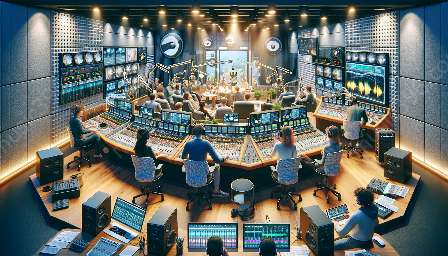College radio stations play a crucial role in providing a platform for students to express themselves, discover new music, and engage with their community. Behind the scenes, these stations rely on a complex network of technical operations to ensure smooth broadcasting, quality sound, and efficient management.
In this comprehensive guide, we will delve into the technical operations of college radio stations, covering topics such as broadcasting equipment, studio design, and station management. By understanding the inner workings of college radio stations, we can gain a greater appreciation for the vital role they play in the media landscape.
Understanding Broadcasting Equipment
One of the foundational aspects of college radio station technical operations is the broadcasting equipment. This includes transmitters, antennas, audio consoles, microphones, and recording devices. Each piece of equipment plays a critical role in capturing, processing, and transmitting audio content to the station's audience.
Transmitters are essential for broadcasting the radio signal over the airwaves, with the power and range of the transmitter directly impacting the station's reach. Antennas, on the other hand, receive and transmit radio signals, ensuring that the broadcast reaches the intended audience.
Audio consoles are at the heart of the studio, allowing DJs and producers to mix audio, control volume levels, and apply effects to the sound. Microphones are used for live broadcasts, interviews, and recording sessions, capturing the voices and sounds that define the station's unique identity.
Optimizing Studio Design
Studio design is another crucial aspect of college radio station technical operations. An effective studio layout and acoustics can significantly impact the quality of the broadcast and the overall comfort of the staff and volunteers.
When designing a radio studio, factors such as soundproofing, equipment placement, and workflow optimization must be carefully considered. Proper soundproofing ensures that external noise does not interfere with the broadcast, while also preventing sound leakage from the studio.
Effective equipment placement helps create an ergonomic and efficient workspace for DJs and producers, allowing them to access essential tools without disrupting their workflow. Additionally, studios must be designed to accommodate live performances, interviews, and collaborative projects, providing a versatile and adaptable environment for creative expression.
Managing Station Operations
Behind every successful college radio station is a dedicated team of managers and staff who oversee the day-to-day operations. Station management involves a range of technical and administrative tasks, including scheduling, maintenance, and compliance with broadcasting regulations.
Managing the station's programming schedule is a crucial aspect of operations, ensuring that there is a diverse range of shows and content to cater to the station's audience. Additionally, regular maintenance of broadcasting equipment and studio facilities is essential for ensuring smooth and uninterrupted broadcasting.
Compliance with broadcasting regulations, such as FCC guidelines, is a fundamental aspect of station management. This involves maintaining accurate station logs, addressing any technical issues promptly, and adhering to ethical standards of broadcasting.
Impact on the Community
The technical operations of college radio stations have a significant impact on the surrounding community. By providing a platform for student expression, local music, and alternative perspectives, these stations contribute to the cultural and social fabric of their communities.
Furthermore, college radio stations often collaborate with local businesses, artists, and organizations, fostering a sense of community engagement and support. The technical expertise and resources of the station are leveraged to organize events, fundraisers, and promotional campaigns that benefit the local community.
In conclusion, the technical operations of college radio stations are essential for ensuring the smooth and effective delivery of diverse content to the audience. From broadcasting equipment to studio design and station management, these operations form the backbone of a vibrant and dynamic media platform that enriches the college experience and community at large.









































